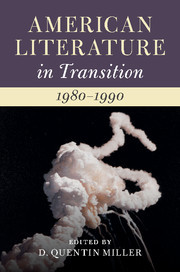Description
American Literature in Transition, 1980–1990
American Literature in Transition Series
Coordinator: Miller D. Quentin
This volume argues that the 1980s is the most significant American literary decade in the late twentieth century.
Language: English
Publication date: 12-2017
346 p. · 16x23.6 cm · Hardback
346 p. · 16x23.6 cm · Hardback
Description
/li>Contents
/li>Biography
/li>
History has not been kind to the 1980s. The decade is often associated with absurd fashion choices, neo-Conservatism in the Reagan/Bush years, the AIDS crisis, Wall Street ethics, and uninspired television, film, and music. Yet the literature of the 1980s is undeniably rich and lasting. American Literature in Transition, 1980?1990 seeks to frame some of the decade's greatest achievements such as Toni Morrison's monumental novel Beloved and to consider some of the trends that began in the 1980s and developed thereafter, including the origins of the graphic novel, prison literature, and the opening of multiculturalism vis-à-vis the 'canon wars'. This volume argues not only for the importance of 1980s American literature, but also for its centrality in understanding trends and trajectories in all contemporary literature against the broader background of culture. This volume serves as both an introduction and a deep consideration of the literary culture of our most maligned decade.
Introduction: the screen and the page D. Quentin Miller; 1. Magic, meet realism: world mythology on American soil D. Quentin Miller; 2. Youth culture on the skids: Generation X and Brat Pack fiction Kevin L. Ferguson; 3. Womanism Kameelah Martin; 4. Revisiting masculinity Josef Benson; 5. The ghosts of history (1): the Holocaust reexamined S. Lillian Kremer; 6. The ghosts of history (2): narrative authority and contemporaneous social subjectivity in the neo-slave narrative Beauty Bragg; 7. The enduring literary legacy of the Vietnam War Walter W. Hölbling; 8. 'How did I get here?': Roth, Updike, and the embarrassment of riches Kathy Knapp; 9. A prison nation and freedom dreams: 1980s literature of incarceration Katy Ryan; 10. The horror! The Stephen King industry Carl Sederholm; 11. Poetry, language, and history in the 1980s Thomas Gardner; 12. 'An imaginary story': comic books and graphic novels in the 1980s Brian Cremins; 13. 'Pop operas, or Broadway sells T-Shirts! Colleen Rua; 14. Working-class fiction and 'dirty realism' Evan Brier; 15. The surge of Latino lit Ilan Stavans; 16. The culture wars and the canon debate Mary Jo Bona; 17. 'We are the world, we are the children': 1980s world literature bears witness to US-American exceptionalism and imperialism Nicole Sparling; 18. Literature in an age of plague: the AIDS epidemic Tyler Bradway; 19. Libertarian fictions: violence and the free-market radicalism of 1980s literature Thomas Heise; 20. Neoconservative ascendancy, the Reagan Age, and literature's response Bob Batchelor; 21. The literature of high finance in the 1980s Leigh Claire LaBerge; 22. From nuclear fear to shades of gray: the end of the Cold War Steven Belletto.
D. Quentin Miller is the author, editor, or co-editor of ten books, most recently The Routledge Introduction to African American Literature (2016), 'A Criminal Power': James Baldwin and the Law (2012), and Prose and Cons: Essays on Prison Literature in the United States (2005). Forthcoming books include Understanding John Edgar Wideman and James Baldwin in Context. He has also published more than two dozen articles or chapters on contemporary literature. Moreover, he is a fiction writer and plans to write a memoir / intellectual history of the 1980s as a companion to this volume.
© 2024 LAVOISIER S.A.S.





